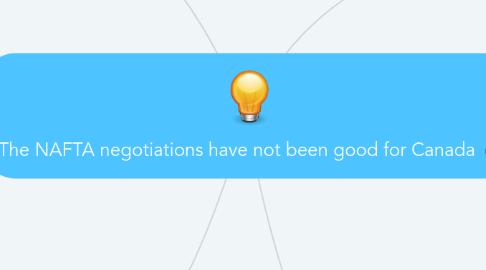
1. Trade negotiations take longer time, and thus the processes end up being time consuming.
1.1. Trump renegotiated and threatened Canada and Mexico by elevating tariffs. He also emphasized that if the NAFTA agreements do not satisfy him, he will withdraw (Hart, 2018).
1.1.1. Renegotiations and proposing agreements among 3 different countries is time-consuming because they have distinctive needs, wants, perspectives, GDP statuses, and goals.
1.1.1.1. One country has to wait for another's agreement on its decisions which makes it not effective and time wasting.
1.2. The US: Raise border taxes for Mexico, and tariffs on steel and aluminum imports. Canada: No! Mexico: No! The US: Sorry, I'm not satisfied with your answers.
2. There is an imbalance of profitial or beneficial distributions between the US, Canada, and Mexico.
2.1. The US and Canada are losing jobs and productions (Rubin, 2017).
2.2. There is no income obtained by Ontario households (Rubin, 2017).
2.2.1. Hatred has risen between the US and Mexico because NAFTA send jobs away from the US and Canada to Mexico.
2.2.1.1. Trump came up with irrational and absurd trade solutions so as to stop Mexico from gaining their profits which indirectly affects Canada's economy on trades.
2.3. Mexico receives numerous of manufacturing jobs and products due to low trade barriers and tariffs (McBride, 2017).
2.4. Advantages and Disadvantages received between the 3 countries
3. The well doing of one country affects another.
3.1. Trump did not elevate the US job / GDP growth since he won the election, and the growth remains below average (Chu, 2017).
3.2. Trump did not contribute to the loss of the US national debt in terms of money (Chu, 2017) which has led to negative contributions to the US economy.
3.2.1. Inflation, trade imbalances, unemployment, income inequality, expensive tuition fees, high wages, and low labor salary (Herbst, 2013) are more likely to occur when there is an economy recession in the US as well as Mexico.
3.2.1.1. Canada's economy will be affected negatively and simultaneously when the US and Mexico are in recession, it is also due to the linkage between those countries in NAFTA. The three countries might have to renegotiate their tariff rates and trade regulations with respect to economic failings.
3.3. Corruption in Mexico is a serious issue (Gan, 2016). Besides, Trump is trying to pose threats toward Mexico which could negatively affect its economy by making them pay for crossing the boarder (He, 2017).
4. The consistency of thoughts, decisions as well as goals are not united between the US, Canada, and Mexico.
4.1. Trump desires to leave the NAFTA and would like to renegotiate because it steals job away from the US (Gillespie, 2016), and the blue-collars works are impacted negatively (Jazeera, 2017). Trump holds grudges towards Mexico and demands Mexico to pay for border taxes (Aleem, 2018).
4.2. Trump plans on inflicting tariffs on the imports of steels and aluminum (Diamond, 2018). He also proposed trade strategies that offend other countries, like China (Cohen,2018). However, Canada and Mexico did not take part in the decision and planning of it.
4.2.1. Conflicts of Thoughts: Canada + Mexico VS the US
4.2.1.1. No clear decisions can be made together Appears to be more like an antipathetic argument than peaceful negotiations
4.2.2. International involvement

